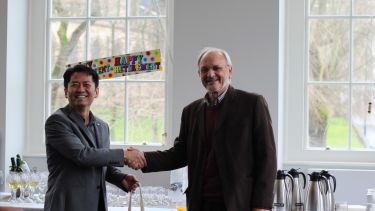Why did you join the Department of Electronic and Electrical Engineering at the University of Sheffield in 1978?"After a three year post-doctoral period working in industry I decided that an academic career was for me. It seemed to offer more freedom to do what I was interested in and, at that time, was a more secure career than that offered by industry. EEE at Sheffield had (and still has!) a very good reputation in my chosen field of semiconductors and was the only University with advanced facilities to produce semiconductor crystals and turn them into electronic devices." Why you chose your area of research of transistor devices - what excited/excites you still about this area and why?"Having studied Physics for my first degree I became interested in the electronic and optical properties of solids or, more specifically, semiconductors. Although solid-state transistors had been around for some time, the early stages of integrated circuit development arose at the time of my PhD and also light emitting diodes (LEDs) were starting to make an appearance. Perhaps due to my Physics training, I was fascinated by what was happening inside these devices to produce the observed very useful effects. I discovered that only by having a deep understanding of the physics of device operation was one able to contribute to new levels of understanding and produce novel design concepts." What has been the highlight of your career and why?"Undoubtedly my career highlight was the seven-year period I did as Head of Department. It was during this time that I came to truly understand what leadership meant and its importance to both the Departmental well-being as a whole and to individual staff careers. It was tough from a workload perspective but, nonetheless, extremely rewarding." How has the field of EEE changed since you began your career and where do you think the future of EEE will take the world?"When I started work in the Department personal computers were virtually non existent and very expensive. Since then we have seen the rapid development of computers and microprocessors such that they are now a big part of everyone's daily lives. However, the value of such technologies was limited until great strides were made in communications. Semiconductor lasers and optical fibres were instrumental in enabling the internet and this, combined with mobile (wireless) devices, unleashed the rapidly expanding computer power to the point where we all use it in our various electronic gadgets without giving it a second thought. Regarding the future in EEE, I think more people have got this spectacularly wrong than not, so I will confine my comments to foreseeable technologies - there are bound to be many, as yet invisible, novel technologies which have yet to be been invented! Microprocessors will move away from traditional integrated circuits to quantum computing which will enable the continued rapid expansion of computing power as has been seen in the past 40 years or so. There must also be a matched expansion in communications capacity through increased wireless frequency and continued optical fibre developments. Although scary to many, autonomous vehicle use will expand to include personal air travel. Electronics will play a big part in alleviating climate change through improved efficiency systems and if a battery storage breakthrough fails to materialise then methods of transferring energy on the move will be required." What advice would you give to academics/students starting out at the beginning of their career in EEE - either in academia or industry?"My advice would be that, if possible, one should follow a subject path which is of passionate interest, and not just where the money or jobs are. This is not always possible, especially at the beginning of one's career, but one should always try to follow a path of maximum personal interest to the point where ideally it becomes like a hobby! After all, the subject breadth in EEE is enormous, and growing!" What are your plans for retirement?"I plan to continue my interest in DIY and gardening, and also revive a boyhood interest in model making." For more information on semiconductor research please visit the Semiconductor Materials and Devices Group page. |
Department says farewell to Professor Houston

